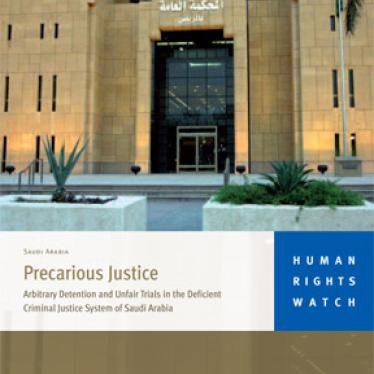(Washington D.C.) - Saudi prosecutors should immediately ensure that prison authorities set free all prisoners whose sentences have expired, Human Rights Watch said today.
At least four Saudi, Yemeni, and Pakistani prisoners in al-Ha'ir prison, south of Riyadh, still remain in prison a month to three months after having completed their sentences, Human Rights Watch has learned. The men remain in prison even though a unit in the prosecutor's office is supposed to monitor prisons to make certain that everyone being held is detained legally.
"Saudi prosecutors are failing in their duty to make sure prisoners are being released as soon as their time is up," said Sarah Leah Whitson, Middle East director at Human Rights Watch. "The only ones who pay for Saudi authorities' failure to apply the law are those who languish in prison arbitrarily."
The Office for Prison Supervision and Execution of Sentences, part of the Interior Ministry's Bureau for Investigation and Public Prosecutions, is supposed to monitor the detention sites. Article 3(f) of the 1989 Law of Interrogation Authority and Public Prosecution obliges the officials to "listen[...] to the complaints of prisoners and detainees, and verify[...] the legality of their imprisonment or detention, the legality of their remaining [detained after] the termination of their sentences, and taking the necessary actions to release whomsoever [is] imprisoned or detained without a legitimate reason."
Current and former prisoners in more than 10 Saudi prisons have told Human Rights Watch that prosecutors rarely visit prisons. In one wing of al-Ha'ir prison, inmates said they had not seen an official from the monitoring division in over four years. Inmates there said that about 10 of the 100 inmates in that wing remained there even though they had completed their sentences.
A Saudi man in that wing of al-Ha'ir prison said his sentence had expired on March 7, 2010, but that the prison authorities had not informed him of his release date or taken any other steps toward releasing him.
A Yemeni man said his sentence expired on January 29 and that the Yemeni embassy had issued him a permit to cross the Saudi-Yemeni border to be deported. He said that there were no outstanding investigations, charges, or claims against him. Another Yemeni said his sentence expired on March 1, and that he also had a Yemeni embassy border crossing permit to be deported and that no procedures were pending against him.
A Pakistani man said his sentence expired on February 7 and that the Pakistani embassy had prepared the papers for his deportation, but that he remained forgotten in the prison. He added that that his sentence included a fine of several thousand Riyals, but that he had benefited from an amnesty in the Muslim holy month of Ramadan under which the state settled the amount he owed.
In a 2008 study of the Saudi criminal justice system, Precarious Justice: Arbitrary Detention and Unfair Trials in the Deficient Criminal Justice System of Saudi Arabia, Human Rights Watch detailed ten cases of prisoners detained beyond the expiration of their sentences, including in al-Ha'ir prison.
The report found that in addition to negligence, other reasons why prisoners sometimes were held beyond the end of their sentences were outstanding civil claims, unsettled debts, unresponsiveness by embassies to deportation orders against their imprisoned nationals, and unadministered lashes as part of the sentence. These factors are not valid reasons for keeping prisoners detained when their prison sentences expires, though. International law, apart from prohibiting arbitrary detention, specifically bans detention on the grounds of inability to fulfill a contractual obligation. Furthermore, as far as Human Rigths Watch was able to determine, none of those factors applied to the four prisoners cited.
Judges in Saudi Arabia only rarely give convicted persons copies of the court verdict. Each of the four prisoners whose sentences had ended told Human Rights Watch that the judge in their case did not give them a written verdict, but informed them orally of its content. As a result, none of the four have anything on paper to prove their release date to prison authorities. In November 2006 the director of al-Ha'ir prison told a visiting delegation from Human Rights Watch that the prison administration keeps these files for each prisoner and has the authority to release prisoners on the date the sentence ends without requiring further authority.







